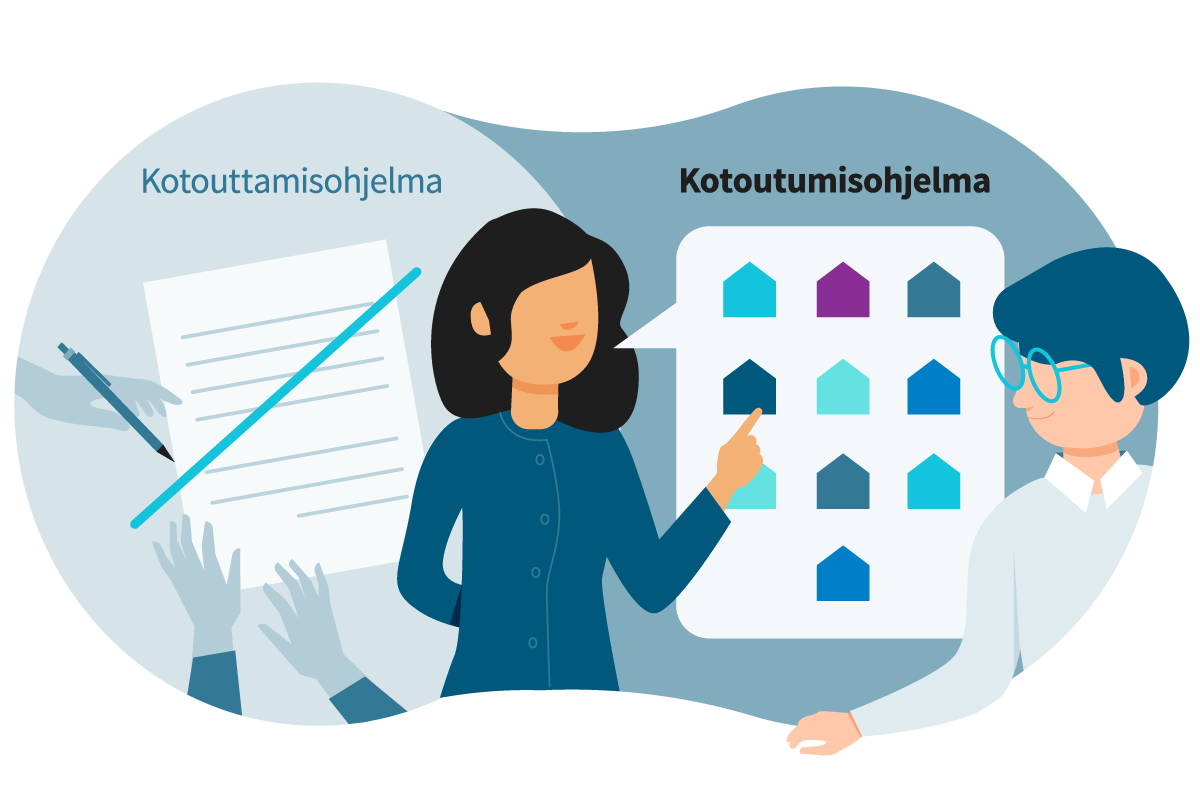An integration programme is a service package for the early stages of integration organised by municipalities. The objective of the services included in an integration programme is to promote the immigrant’s integration, employment or entrepreneurship, skills and working life competencies. An integration programme also supports the realisation of non-discrimination, inclusion and equality, as well as health and wellbeing. The services included in an integration programme support day-to-day civic skills and participation in the activities of organisations and other activities in society.
The Act on the Promotion of Immigrant Integration (hereinafter the Integration Act) includes provisions on the minimum contents of an integration programme. At a minimum, an integration programme must include
- an assessment of skills and service needs related to integration
- an integration plan drawn up on the basis of the above
- multilingual civic orientation
- integration training, including final testing of language skills
- other education and services that promote Finnish and Swedish language skills, literacy social and work skills and employability and entrepreneurship
- guidance and advisory services during the integration programme.
The employment authority is responsible for arranging the services included in the integration programme for immigrants and integration customers who are jobseekers. The municipality is responsible for organising services for other immigrants and integration customers. Municipalities can decide how to organise services included in the integration programme for immigrants who are inactive, that is, not part of the labour force. Municipalities can also decide with the employment authority that the employment authority will also organise integration services for inactive immigrants. A municipality may implement an integration programme or part of it in cooperation with other municipalities.
Municipalities can also develop their own services as part of the integration programme. Municipalities have the opportunity to provide immigrants with other services that promote employment, entrepreneurship, work and functional capacity, wellbeing and health or integration, as well as an introduction to or participation in civic and community activities, associations, or other social, cultural and leisure activities.
An integration programme must take into account the multi-sectoral approach and cooperation with third-sector operators and employers. Since supporting employment is a key part of promoting integration, cooperation with employers is central to organising services.
The municipality is responsible for ensuring that the integration services included in the integration programme and other services, that the municipality is responsible for organising, have the content and scope needed in the municipality. The municipality is also responsible for ensuring that the integration programme and other services form a coherent service package that meets the need.
The integration programme is used as a tool for customer work in the early stages of integration. Together with the customer, the employee selects from the integration programme’s service package the services that will support the customer’s individual integration and inclusion in working life in the best possible way. Participation in the services is agreed in the customer’s individual integration plan.
Checklist for drawing up the integration programme

What is the difference between an integration programme under the current act and an integration programme under the reformed act?
The Integration Act (1386/2010), which was in force until the end of 2024, provided for a municipal planning document called an integration programme. When the new Integration Act entered into force, the concept of the integration programme as referred to in the previous act was abandoned. The integration programme provided for in the reformed act does not replace or correspond with the integration programme under the current act. The new integration programme is therefore a new element. Municipalities will continue to have an obligation to plan and develop integration. This task is provided for in chapter 5 of the reformed Integration Act.
When translated directly into English, there is no corresponding difference between the Finnish terms referring to the integration programmes, ‘kotoutumisohjelma’ and ‘kotouttamisohjelma’. The integration programme referred to in the reformed act (681/2023) does not correspond to the term municipal integration programme in force until the end of 2024 (1386/2010), which may have been also referred to as an integration programme in communications and non-legal texts.
Municipalities must have an office-holder liable for acts in office to perform tasks that involve the exercise of public authority
The assessment of service needs related to integration and skills (referred to as an assessment of service needs related to skills and integration in the legislation) and drawing up integration plans is a matter of exercising public authority. The municipality must have an office-holder liable for acts in office to perform these tasks. The municipality cannot outsource these tasks.
Instead, the municipality and the employment authority can choose whether to perform the following tasks themselves or outsource them to, for example, an education provider, an organisation or other service provider:
- expert assessment conducted as part of the assessment of service needs related to integration and skills (referred to as an assessment of service needs related to skills and integration in the legislation), for example, to assess language proficiency,
- integration training, and
- multilingual civic orientation.
Describing the early-stage integration package to customers is important
The municipality should explain the service package for the target groups in the early stages of integration, for example on the municipality’s website or in other channels. The municipality should describe the objectives of promoting integration, the offering and importance of measures and services from the customer’s point of view.
When the municipality communicates about early-stage services for integration, attention should be paid to the accessibility of the package and the inclusion of the target groups.



